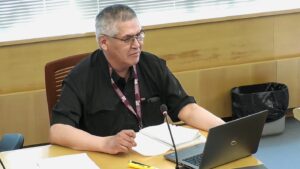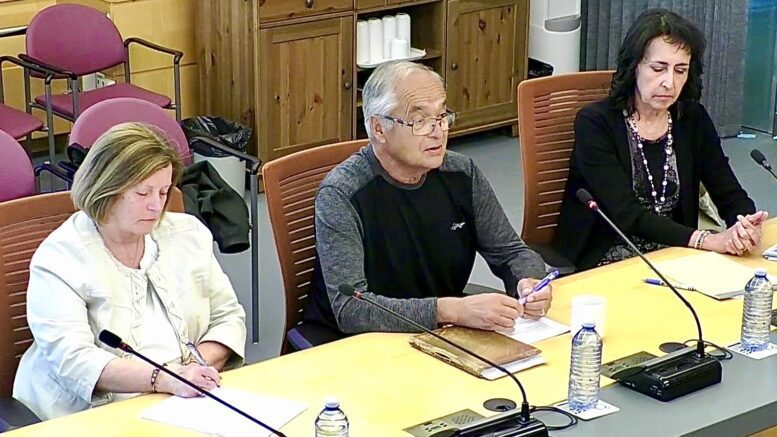“They go into different post-secondary schools and (told) they’re not qualified. That’s a real, real hard thing to see.”
– Mackenzie Delta MLA George Nerysoo.
“It costs (the GNWT) a lot of time and money to prepare students who come out with a Grade 12 (diploma). But it’s not really a Grade 12. They’re not prepared to take the the (post-secondary) courses. So, we have to spend a year, two years preparing them to take the courses.”
– Aurora College board chair Joe Handley.
High school grads showing up at Aurora College’s door without the academic skills needed to enroll is discouraging students and preventing the NWT from developing a skilled workforce.
Aurora College senior officials were called to the GNWT’s office today to answer economic-related questions from MLAs on an oversight committee.
In his opening statement, Aurora College board chair Joe Handley asked how results coming out of the K to 12 system could be improved.
“It costs us (the GNWT) a lot of time and money to prepare students who come out with a Grade 12. But it’s not really a grade 12. They’re not prepared to take the courses. So, (the college) has to spend a year, two years preparing them to take the courses, whether it’s in nursing or in education or any field,” said Handley, who was the 10th NWT premier from 2003 to 2007.
“And that’s a concern of how do we work more effectively with the K to 12 system to that Grade 12 is Grade 12? I think the students will feel a lot better, as well, than being led to believe they have a Grade 12. But then come in and find out they don’t qualify.”
Mackenzie Delta MLA George Nerysoo said the disappointment felt by some high-school grads who discover their diplomas aren’t what was promised is tangible.
“When they go on to finish high school and they’re going into post-secondary schools, or are trying to anyway, it’s very difficult for them. They go on the expectation that they have a diploma so that they’re ready for life after high school, then they’re not qualified,” he said.
“And that’s it’s a real, real hard thing to see. I’m just wondering all of you will be working directly with the … the education department and the high schools to try to improve the success rate in high school is anyway.”

Mackenzie Delta MLA George Nerysoo in committee Thursday. (Image courtesy of Assembly Livestream.)
Replied Handley: “Yeah, it’s a tremendous problem for us … because we want to work with the high schools. We don’t want to gradually become an upgrading institution, preparing people for trades and so on … we want them to come (to us) with a full grade.
“So, from the board’s perspective, we were very concerned about this. We realized that there may be more we can do, and we will be discussing it further this year.
“Teachers in the K to 12 system feel under pressure to turn out Grade 12 graduates, no matter how they do it … the more they can get at the graduation ceremony … the better they seem to have done. But at the same time, trying to balance that was with turning out good quality Grade 12s.
“So, we’ve been trying to reach out to leaders, the community leaders and regional leaders to say how do we work together with you, because it’s not just the teachers, it’s the whole community.”
One move that should help is the creation of academic advisor positions. This is something President Glenda Vardy Dell says should have happened some time ago.
“This is the first time, and I find myself incredible to say this, is the first time that we are creating academic advisor positions so that students that are interested in coming into a royal college will meet with an academic counselor either on site or via (Microsoft) Teams or in another virtual method to talk about what the pathway for them could be for them to be able to get where they want to be,” she said.
“As an institution, we should have had academic advisors from the get go. So that’s another thing that we’re looking at in terms of trying to address the problem that students aren’t coming out of K to 12, with what they need.”
Housing was another major concern for the college right now, let alone after transition to a polytechnic university. For example, Fort Smith’s Thebacha Campus is forced to use a former residential school to house students, a prospect which has seen potential Indigenous enrollees walk away.
The Yellowknife campus had 90 students on a waitlist, while Inuvik’s Aurora Campus single-student ‘dorm-style’ rooms stay vacant, the need being for accommodations for young families.
Funding was also a problem. Vardy Dell noted she disbanded the Aurora College Transformation Team at the end of December of 2023, “because we no longer had dollars to continue with that work.”
Staff were handed those duties, but they have their original jobs to do as well.





